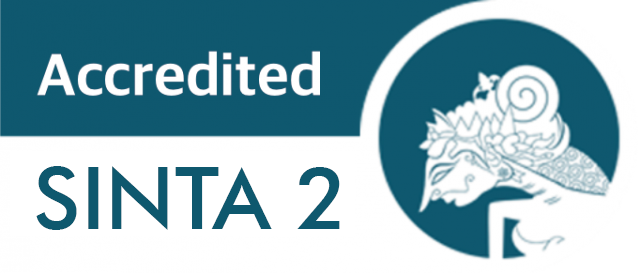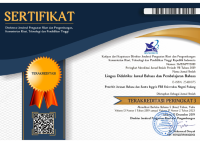PERAN PEMBACA DALAM MENULIS
 ),
), (1) FBS Universitas Negeri Padang
 Corresponding Author
Corresponding Author
Copyright (c) 2017 Lingua Didaktika: Jurnal Bahasa dan Pembelajaran Bahasa
DOI : https://doi.org/10.24036/ld.v1i1.7351
Full Text:
 Language : id
Language : id
Abstract
This article explores the role of audience in developing one’s writing. There are three main issues discussed here: 1) Writing English as a foreign language, 2) considering audience in writing, and 3) acting as audience in writing. A brief of the nature of writing in English as a foreign language is intended to provide an understanding difficulties faced by the students in writing. The second issue deals with theories and research findings showing the importance of considering audience in writing. The last part of this article presents an example of how to take audience into consideration as a strategy to help students develop their writing.
Keywords
References
Campbell, Cherry. 1990. Writing with others’ words: using background reading text in academic composition. Dalam Kroll, Barbara (Ed.). Second Language Writing: Research insights for the classroom. New York: Cambridge University Press.
Cohen, M. dan Riel, M. 1989. The effect of distant audience on students’ writing. American Education Research Journal, 26/2: 143-159.
Fathman, Ann K. 1990. Teacher response to student writing: focus on form versus content. Dalam Kroll, Barbara (Ed.). Second Language Writing: Research insights for the classroom. New York: Cambridge University Press.
Frodesen, Jan. 2001. Grammar in writing. In Marianne Celce Murcia (Ed.), Teaching English as a second or foreign language (ed. 3), 233-248. New york: Heinle & Heinle.
Gebhard, R.C. dan Rodriges, D. 1989. Writng projects on personal experiences. In R.C. Gebhard dan Rodriges (Ed.), Writing processes and indentions, 161-190. Lexington: D.C. Heath & Company.
Hyland, Ken. 2004. Genre and second language writing. Ann Arbor: The university of Michigan Press.
Kress, Gunther. 1982. Learning to write. London: Routledge & Kegan Paul.
Meyers, L.Bensel.1992. Rhetoric for academic reasoning. New York: harper Collins Publishers, Inc.
Roen, D.H. dan Willey, R.J. (1988). The effects of audience awareness on drafting and revising. Research in theTeaching of English, 22/1: 75-83.
Rozimela, Yenni. 1993. The impact of writing for different kinds of audience on a group of year 11 students’ writing proficiency at an inner city secondary college in Victoria. Unpublished thesis. Melbourne
Schoonen, Rob et. al. 2003. First language and second language writing: The role of linguistic knowledge, speed of processing, and metacognitive knowledge. Language Learning, 53/1:165-202.
Thompson, Geoff. 2001. Interaction in academic writing: Learning to argue with the reader. Applied Linguistics, 22/1:58-78.
 Article Metrics
Article Metrics
 Abstract Views : 472 times
Abstract Views : 472 times
 PDF Downloaded : 97 times
PDF Downloaded : 97 times
Refbacks
- There are currently no refbacks.
Copyright (c) 2017 Lingua Didaktika: Jurnal Bahasa dan Pembelajaran Bahasa

This work is licensed under a Creative Commons Attribution-NonCommercial 4.0 International License.









